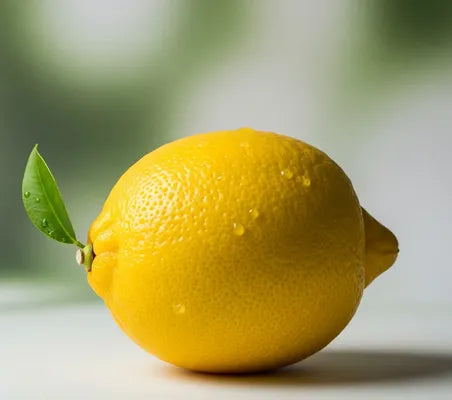
D-limoneno is a natural compound that is extracted from the shells of citrus fruits such as lemon, orange or tangerine. This terpene has become a strategic resource for the chemical, food and industrial cleaning industry because of its ability to act as a natural solvent, flavouring and bioactive agent.
Its growing popularity responds to two key factors: the substitution of petrochemical solvents and the need for ingredients that guarantee safety, security and sustainability in production processes.
In Frutech we tell you what D-limonene is, how it is obtained from citrus oil and what are its main industrial applications.
What is D-limonene
D-limonene is a monoterpene that represents between 80% and 95% of citrus essential oils. It is responsible for the characteristic fresh aroma of citrus and is presented as a colorless liquid with high dissolving power.
Its importance lies in the fact that it combines functional properties (solvent, antimicrobial, antioxidant) with versatility of application in sectors as diverse as chemical, food and cleaning.
Chemical characteristics
Some of the main properties of D-limonene are:
-
Appearance: transparent liquid, insoluble in water, soluble in oils.
-
Properties: biodegradable, low toxicity, natural solvent of fats and resins.
- Stability: can oxidize if exposed to light and air, so requires airtight containers.
These features make it a reliable alternative to aggressive chemicals.
Industrial applications
D-limonene has become a transversal input in various industries:
- Chemical industry Food.
- Industrial cleaning
- Cosmetics and personal care
- Agricultural
Its versatility has made it a high-demand product in the global market.

Obtaining D-limonene from citrus oil
D-limonene is obtained as a by-product of the industrial processing of citrus fruits, especially in the production of juices. The shells, which represent a large volume of waste, are exploited to extract essential oils rich in this compound.
Extraction and distillation processes
-
Cold pressing: extraction of the essential oil from citrus peels.
-
Fractional distillation: separation of the various terpenes, isolating the D-limonene.
-
Purification and concentration: industrial processes to ensure a high degree of purity and stability.
This model of exploitation is integrated in the circular economy, since it converts agro-industrial waste into a product with high added value. Industrial safety considerations.
Industrial safety considerations
Although it is a natural ingredient, D-limonene requires good industrial safety practices in its handling:
-
Flammability: must be stored in airtight containers and ventilated areas.
-
Handling: use of gloves and goggles to prevent dermal irritation.
- Storage: keep in cool places, protected from light and excessive heat.
Compliance with these measures allows companies to ensure operational safety and quality of the final product.
Uses in industry
Chemical and food industry
-
In chemistry, D-limonene replaces petroleum-derived solvents, reducing the environmental impact and improving occupational safety.
- In food, it acts as a natural flavouring and antioxidant, besides being approved by entities such as the FDA and the EFSA for human consumption.
Advantages over other solvents
D-limonene offers multiple benefits over traditional solvents:
-
Biodegradable and eco-friendly, reducing the environmental footprint.
-
Safe and non-toxic at appropriate concentrations
-
Versatile, suitable for industrial and consumer applications.
- Effective as a natural degreaser and cleaner.
Safety and handling standards
The use of D-limonene is regulated by international regulations that guarantee its safety:
- FDA (Food and Drug Administration) in the United States.
- EFSA (European Food Safety Authority) in Europe.
-
ISO 9235: reference standard for natural essential oils.
Industry protocols
- Evaluate occupational exposure levels.
- Implement adequate ventilation systems.
-
Establish quality controls on each batch.
Quality and purity control
For use in industrial applications, D-limonene must meet high quality standards:
-
Chromatographic analysis (GC-MS) to verify chemical composition.
- Sustainability and traceability certifications.
- Compliance with food and industrial safety standards.

D-limoneno is a compound that combines efficiency, safety and sustainability in industrial processes. Its extraction from citrus oils makes it a clear example of the circular economy and its versatility allows applications in chemistry, food, cleaning and cosmetics.
If you are looking for an option of that terpene, at Frutech we have the ideal products for you. Incorporate safe and efficient D-limonene in your industrial processes.
Contact our technical team for customized solutions.
